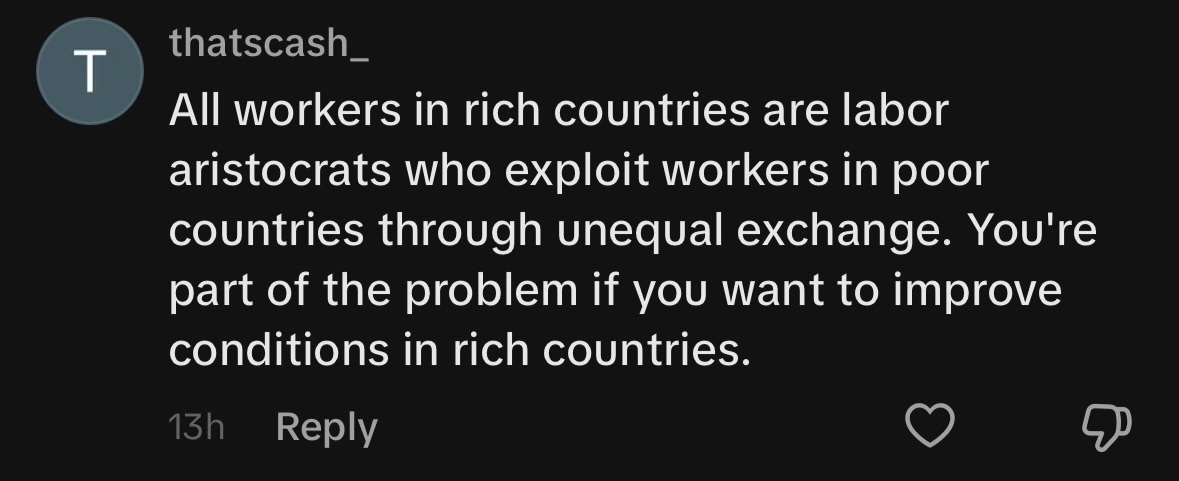104
you are viewing a single comment's thread
view the rest of the comments
view the rest of the comments
this post was submitted on 29 Jun 2024
104 points (98.1% liked)
marxism
3671 readers
1 users here now
For the study of Marxism, and all the tendencies that fall beneath it.
Read Lenin.
Resources below are from r/communism101. Post suggestions for better resources and we'll update them.
Study Guides
- Basic Marxism-Leninism Study Plan
- Debunking Anti-Communism Masterpost
- Beginner's Guide to Marxism (marxists.org)
- A Reading Guide (marx2mao.com) (mirror)
- Topical Study Guide (marxistleninist.wordpress.com)
Explanations
- Kapitalism 101 on political economy
- Marxist Philosophy understanding DiaMat
- Reading Marx's Capital with David Harvey
Libraries
- Marxists.org largest Marxist library
- Red Stars Publishers Library specialized on Marxist-Leninist literature. Book titles are links to free PDF copies
- Marx2Mao.com another popular library (mirror)
- BannedThought.net collection of revolutionary publications
- The Collected Works of Marx and Engels torrentable file of all known writings of Marx and Engels
- The Prolewiki library a collection of revolutionary publications
- Comrades Library has a small but growing collection of rare sovietology books
Bookstores
Book PDFs
founded 4 years ago
MODERATORS

There are some good critiques of thirdworldism in this thread already, so I won't add to them. But it really bothers me, how few people preface their comments with:"Yes, unequal exchange and superexploitation are real. Yes sometimes the working class in the imperial core benefits from them."
Acknowledge the material reality first, then make your argument. Also using "we" and "here" as a synonym for westerners or US citizens, as if no one else was using this platform is problematic.
I'm not thirdworldist and do think the international working class does have common interests and should stand united, but it is important to realize that sometimes western workers behave like a worker aristocracy.
Don't be like them avoid these errors. For example:
When trade unions in the US support strict tariffs on China, because the bosses promise real hard, that then they'll refrain from moving production offshore. Then those unions enter into an alliance with western capital and become complicit in exploitation.
When German leftist organizations want to be seen as reasonable, and acceptable by the state to avoid persecution and keep the little institutional support they get, there is one single thing they know they need to do(and most do it): fail to be anti imperialist and instead support NATO and Israel unconditionally or at least conveniently remain "neutral" to put the interests of the workers "at home" first. In doing so they betray the international working class and become complicit in genocide.
Wherever people say "Yes, we support [struggle abroad / struggle of racialized minorities], but people wouldn't understand yet if we did something about it. So instead, let's focuse on [struggle of privileged parts of western working class] first.
I agree. I have a few more thoughts to add to this.
Workers in the imperial core have a responsibility to see past their immediate circumstances in order to understand that the exploitation of the global proletariat is fundamentally linked with their own exploitation. That although a worker in a rich country may be materially better off than a worker in a poor country, they have more in common, in terms of class position, with the global proletariat than with the bourgeoisie. A western worker who doesn't identify with the global proletariat has an incorrect understanding of their own position.
Superexploitation is not only real, but absolutely integral to contemporary capitalism. Therefore anti-imperialism is an indispensable part of any anti-capitalist movement. A movement which aims only to improve working conditions in rich countries is basically a white socialism, a socialism aiming only for the economic liberation of a subset of privileged workers (the labor aristocracy).
However, it doesn't follow that any organization whatsoever in rich countries is identical to a labor-aristocratic struggle.
If the global average wage is, say, $1 per hour, this says nothing about the material conditions of a worker receiving this average wage. In the US, this wage corresponds to far fewer goods than in Bangladesh. So it would be severely over-simplifying to simply compare a given worker's salary to the global average and declare that any worker earning above the average is benefiting from imperialism, therefore labor-aristocratic. There must necessarily be an analysis of the material conditions of that worker where they live. As well, in the US for example, 7.5% of the population is unemployed or under-employed. This population may receive a wage many times larger than the global average, yet still be unable to afford food or housing or medical care. It would be wrong to say that these people share a class interest with the lanyards working in DC merely because they are American workers.